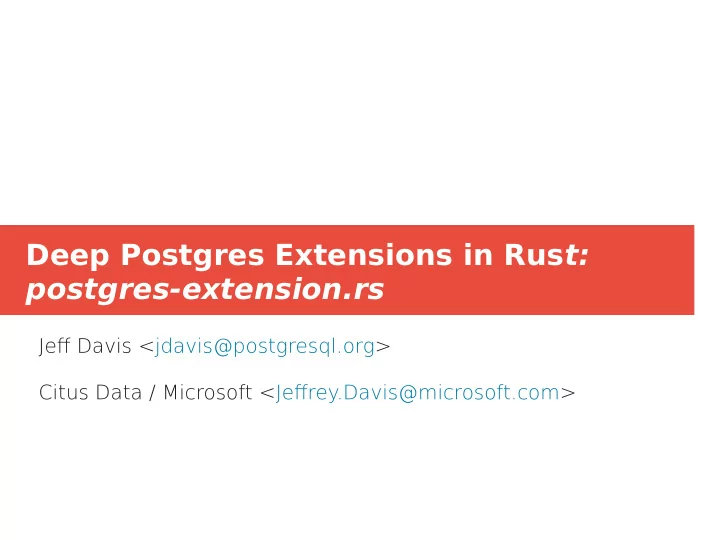

Deep Postgres Extensions in Rus t: postgres-extension.rs Jefg Davis <jdavis@postgresql.org> Citus Data / Microsoft <Jefgrey.Davis@microsoft.com>
Motivation ● Postgres relies on an ecosystem of extensions ● This is a good thing! ● Extensions allow domain-specifjc or experimental development ● Encourage new developers to get involved and new types of extension development ● Rust ofgers a difgerent language and environment ● And brings new ideas! 2
Why Rust? ● Minimal runtime like C: ● No garbage collector or refcounting ● No “extra” code ● No “extra” data held in structs ● Not even a vtable pointer! ● Modern features, safety ● Growing developer community ● Awesome ecosystem 3
The Postgres World is C ● Real extensions used to require C: ● Foreign Data Wrappers ● Custom Data T ypes ● Index and Sort Support Functions ● Background Workers ● UDFs calling internal functions 4
What About Procedural Languages? ● PL/pgSQL, Perl, Python, v8, etc. ● Essentially sandboxes ● Only for UDFs and SPI ● SPI: Server Programming Interface allows execution of arbitrary SQL within a UDF ● We need something more 5
Let’s see what rust can do ● Go beyond the Rust marketing and see how to use it to work with a complex system like postgres: ● Memory Contexts ● Error handling using setjmp/longjmp ● Global variables ● Intricate APIs 6
So what is postgres-extension.rs? ● Allows close integration into the backend as an extension, just like C ● But it’s a pure Rust crate ● A collection of function declarations, macros, and utility functions ● Link seamlessly with C ● Only a subset of support for Postgres internals. Takes on the hardest challenges but many APIs are not yet implemented. 7
Not a Client Driver, PL, or ORM ● There’s already an excellent pure-rust client library: rust-postgres ● Interact with postgresql from client application ● Thanks Steven Fackler! ● postgres-extension.rs is for deeper integration into the postgres server, like a C extension 8
Features 1 ● Can construct and operate directly on Postgres structures ● No copying or translation of data going from C to Rust or Rust to C ● Structure format is declared to be C-compatible ● Uses palloc()/pfree() for all heap allocations ● Even rust standard library calls ● inspect memory usage of rust code separate from other allocations ● elog()/ereport() support 9
Features 2: Solves Error-Handling Mismatch ● If Rust panics, catch it before it returns to C, and turn it into a postgres ERROR ● If postgres calls rust, and rust calls a postgres function, and the postgres function throws an ERROR: ● catch it and turn it into a rust panic before skipping over any rust frames ● Important so that rust destructors are called 10
Demo 1: UDFs and error handling ● DEMO 11
Demo 2: UDF with SPI ● DEMO 12
Demo 3: Concurrent Server with Tokio ● Tokio is an async framework ● Runtime for futures ● Build a background worker extension that: ● Accepts simple SQL statements from concurrent connections to port 8080 ● Executes SQL with SPI ● Returns results 13
Potential Sources of Overhead ● Array bounds checks ● Catching longjmp() at C→Rust boundary ● Catching rust panics at Rust→C boundary ● Converting rust strings to C strings 14
C and Rust, not C or Rust ● Make rust developers more welcome ● Without making C developers less welcome 15
Conclusion ● http://github.com/jefg-davis/postgres-extension. rs ● Try out writing extensions in a new language ● Only some internal postgres interfaces are supported for now ● Rust seems to have passed the test for real database internals ● Rust and Postgres have great potential together 16
Recommend
More recommend